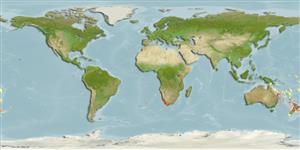分類 / Names
共通名の | 類義語 | Catalog of Fishes(部類, 種) | ITIS | CoL | WoRMS | Cloffa
>
Ophidiiformes (Cusk eels) >
Carapidae (Pearlfishes) > Pyramodontinae
Etymology: Pyramodon: Greek, pyramis = pyramid + Greek, odous = teeth (Ref. 45335).
More on author: Regan.
Environment: milieu / climate zone / depth range / distribution range
生態学
海 底生の漂泳性; 深さの範囲 120 - 731 m (Ref. 6347). Temperate
Indo-West Pacific: off East London, South Africa; Australia and New Zealand.
サイズ / 重さ / 年齢
Maturity: Lm ? range ? - ? cm
Max length : 29.0 cm TL オス/雌雄の選別がない; (Ref. 4104)
Eel-like, moderate to relatively deep body depth; a large single vomerine fang; pelvic fin rays present; swim bladder large, filling visceral cavity and extending past anus; dorsal and anal fin radials robust and elongate; dorsal fin anteriad or directly over anal fin origin; lacking rockerbone, cardiform teeth, and intrinsic swim bladder constrictions or tunic ridges (Ref. 34024). Body lightly pigmented with dorsal and anal fin margins pigmented over posterior quarter; precaudal vertebrae 17-19; anus more posterior with distance from snout to anus 130 to 151% head length (Ref. 34024).
A benthic (Ref. 75154) and rare species (Ref. 34024). Probably a free-living species of the outer shelf and upper continental slope.
Life cycle and mating behavior
成熟 | 繁殖 | 放精 | 卵 | 生産力 | 幼生
Nielsen, J.G., D.M. Cohen, D.F. Markle and C.R. Robins, 1999. Ophidiiform fishes of the world (Order Ophidiiformes). An annotated and illustrated catalogue of pearlfishes, cusk-eels, brotulas and other ophidiiform fishes known to date. FAO Fish. Synop. 125(18):178p. Rome: FAO. (Ref. 34024)
IUCNのレッドリストの状況は (Ref. 130435: Version 2024-1)
Human uses
水産業: 興味がない
用具
特記事項
XMLをダウンロードして下さい
インターネットの情報源
Estimates based on models
Preferred temperature (Ref.
123201): 10.9 - 19.1, mean 13.8 °C (based on 66 cells).
Phylogenetic diversity index (Ref.
82804): PD
50 = 0.5625 [Uniqueness, from 0.5 = low to 2.0 = high].
Bayesian length-weight: a=0.00389 (0.00180 - 0.00842), b=3.12 (2.94 - 3.30), in cm total length, based on all LWR estimates for this body shape (Ref.
93245).
栄養段階 (Ref.
69278): 3.7 ±0.5 se; based on size and trophs of closest relatives
Fishing Vulnerability (Ref.
59153): Low vulnerability (19 of 100).
